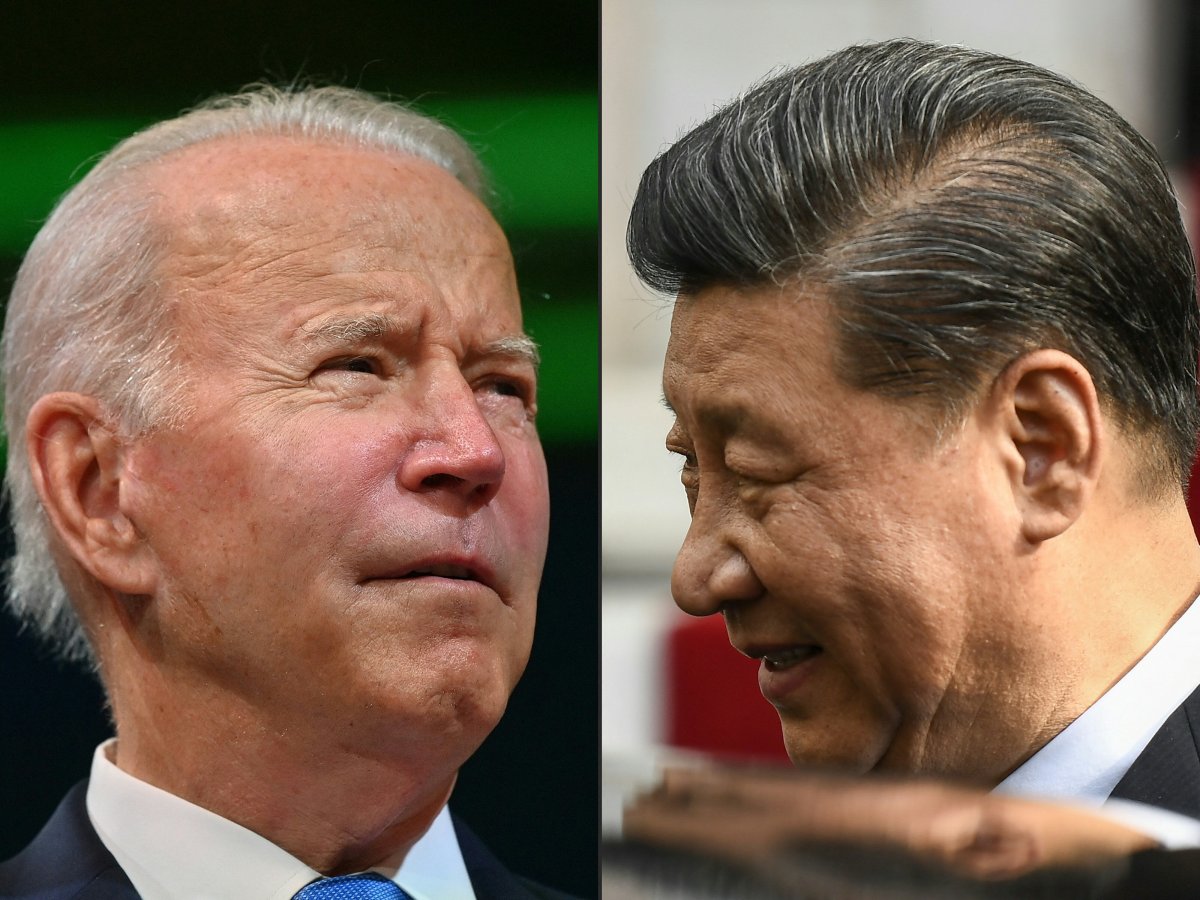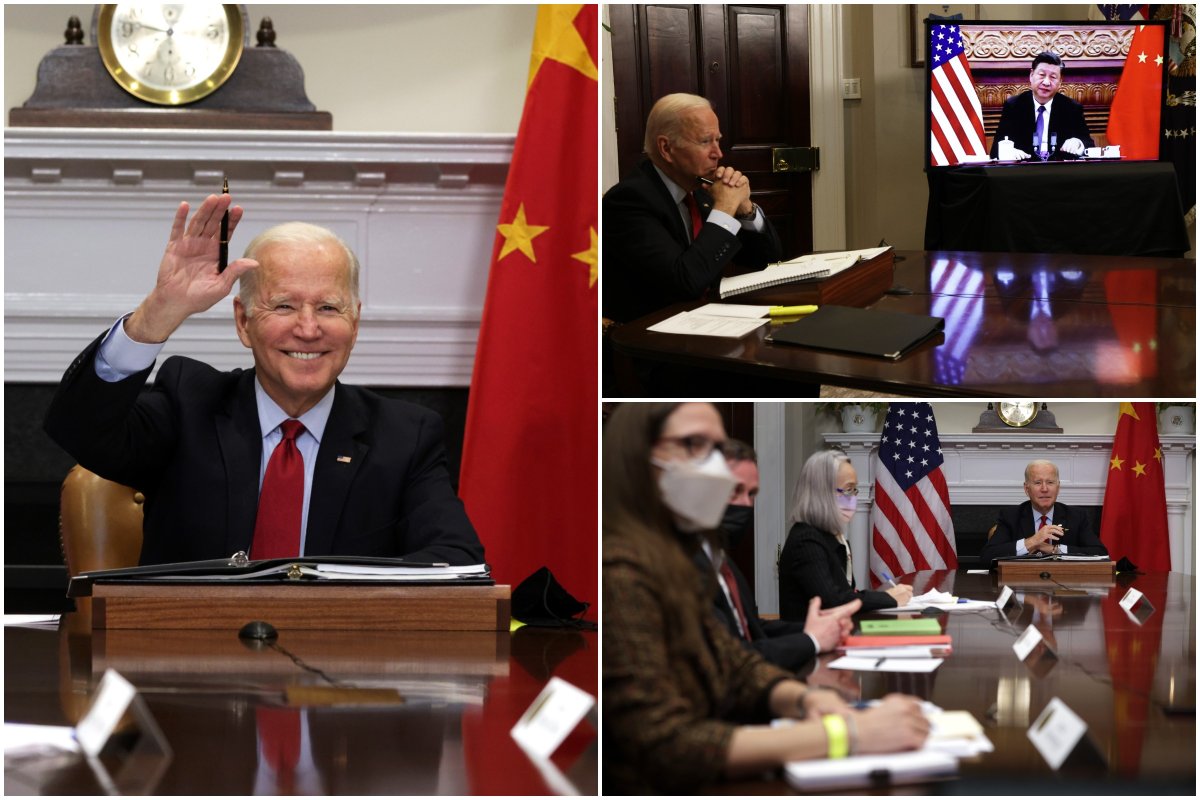President Joe Biden and Chinese President Xi Jinping reflected on tensions and growing differences over Taiwan during a virtual meeting of the two leaders on Monday night.
The United States has reiterated that its support for Taiwan is "rock-solid," amid rising friction with China over the self-ruled island. Although the People's Republic of China (PRC) has never governed Taiwan, it claims sovereignty over the island, which it considers part of its territory under its "one China" principle.
Biden shocked observers last month when he said the U.S. had a "commitment" to protect Taiwan from a Chinese military attack. The White House walked back the remarks soon after. A senior administration official insisted that U.S. policy on Taiwan had remained consistent during a press call ahead of the Biden-Xi meeting.
At the conclusion of the three-hour virtual summit, the White House said President Biden underscored the U.S.'s commitment to its own "one China" policy—distinct from its Chinese "principle" counterpart—guided by the Taiwan Relations Act, the three Joint Communiques and the Six Assurances.
The U.S. "strongly opposes unilateral efforts to change the status quo or undermine peace and stability across the Taiwan Strait," said an official readout.

In its statement, China's Foreign Ministry confirmed that Biden reaffirmed the U.S.'s "one China" policy and its long-standing position of not supporting Taiwan independence. "The U.S. is willing to work with China on the basis of mutual respect and peaceful coexistence, increase communication, reduce misperception and handle differences constructively," the Chinese readout said.
The American "one China" policy—maintained for nearly half a century—has been to recognize the PRC as the sole legitimate government of China, while acknowledging its position that Taiwan is part of said China. The U.S. takes no position on sovereignty over Taiwan and therefore does not support Taiwan independence—official stances that have been articulated at various levels over the many years.
China's Xi told Biden that the "new wave" cross-strait tensions were the result of the Taiwanese government's "independence agenda" and "the intention of some Americans to use Taiwan to contain China."
"We have patience and will strive for the prospect of peaceful reunification with utmost sincerity and efforts," according to Beijing's readout. "That said, should the separatist forces for Taiwan independence provoke us, force our hands or even cross the red line, we will be compelled to take resolute measures."
Taiwan, which is officially known as the Republic of China, has been self-governing since 1949, following a split that occurred at the end of the Chinese Civil War.
Formal diplomatic relations between the U.S. and Taiwan were broken off in 1979 following the normalization of relations with China. However, Washington and Taipei have continued a strong informal relationship since then.
China seeks "reunification" with Taiwan and has never ruled out a military takeover of the democratic island. The possibility of American military intervention during a potential conflict has remained a particularly sensitive flashpoint in U.S.-Chinese diplomacy. The deliberate opaqueness surrounding the American response is known as "strategic ambiguity."

China has recently ramped up military exercises near Taiwan, while urging the U.S. to "step back" from the region. In late October, Taiwanese President Tsai Ing-wen indicated that a small number of U.S. troops were on the island and training Taiwan forces. Last week, Taiwan's biennial defense white paper said 618 U.S. personnel visited Taiwan between September 2019 and August 2021.
"The Taiwan question is the ultimate red line of China," stated a Monday editorial published in the Global Times, a newspaper run by the Chinese Communist Party. "In order to reduce the risk of a strategic collision between China and the U.S., the latter must take a step back from the Taiwan question and show its restraint."
Secretary of State Antony Blinken urged Chinese Foreign Minister Wang Yi to resolve the Taiwan issue "peacefully and in a manner consistent with the wishes and best interests of the people on Taiwan" during a call on Friday, according to State Department spokesperson Ned Price. Wang reportedly warned the U.S. not to send "wrong signals" to pro-independence elements in Taiwan during the same call.
Biden and Xi met each other multiple times while the former served as vice president during the Obama administration. Their virtual summit late on Monday was their first major encounter since Biden became president, although the pair had previously spoken over the phone in February and September. Blinken and Wang were among 11 American and Chinese officials who joined the leaders during the talks.
Uncommon Knowledge
Newsweek is committed to challenging conventional wisdom and finding connections in the search for common ground.
Newsweek is committed to challenging conventional wisdom and finding connections in the search for common ground.
About the writer
John Feng is Newsweek's contributing editor for Asia based in Taichung, Taiwan. His focus is on East Asian politics. He ... Read more
To read how Newsweek uses AI as a newsroom tool, Click here.








